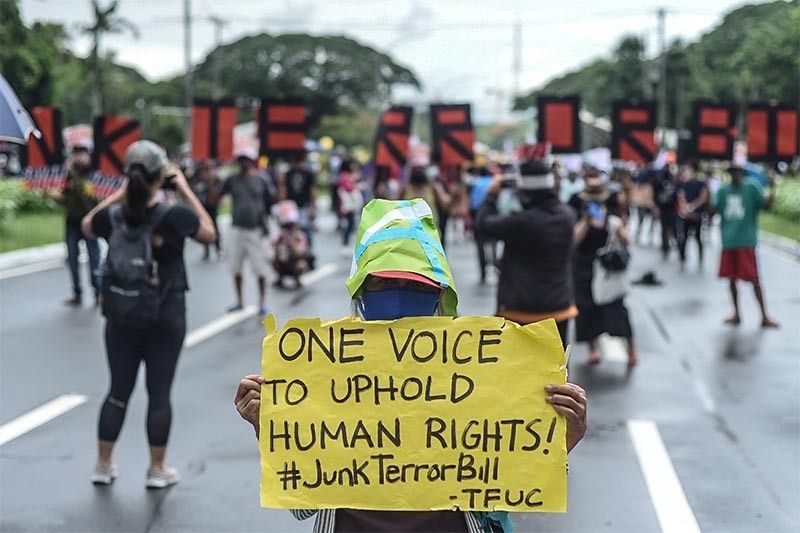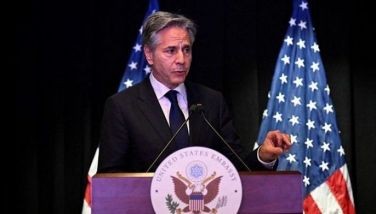In reply to Palace request for comment on anti-terrorism bill, IBP urges veto

MANILA, Philippines — The Office of the President has asked the Integrated Bar of the Philippines for recommendations on the controversial anti-terrorism bill, which Congress has sent to President Rodrigo Duterte for his signature.
Consistent with its public statements, the IBP told Malacañang of the potential infirmities of the proposed new anti-terrorism law, which include a potential constitutional violation of Section 29 or the provision on detention without judicial warrant of arrest.
According to IBP national president Domingo Egon Cayosa's letter-reply to OP’s Deputy Executive Secretary for Legal Affairs Ryan Alvin Acosta, the IBP received the letter from Malacañang on June 17.
Cayosa told Philstar.com that, to his knowledge, the Office of the President's request for input on pending legislation is the “first time in five years or more.”
“It’s Congress that usually asks IBP’s inputs in proposed legislation,” Cayosa said. Asked whether IBP was asked by lawmakers to comment when they were deliberating on the bill, Cayosa replied: “Not on the questionable provisions.”
IBP said it could have suggested “more workable arrangements” had it been invited to relevant hearings in the ATB.
'Lawmakers' sentiments cannot change enrolled bill'
In his letter to Acosta, the IBP president said they also received a letter from Sen. Panfilo Lacson and joined by Rep. Jericho Nograles (PBA party-list) in a webinar on the bill.
"Unfortunately, they do not or could not change the ATB, as worded and submitted to the President of the Republic. Their public statements and insights nevertheless reflect, if not highlight that there are vagueness, infirmities or constitutional issues with the ATB," Cayosa said.
RELATED: Carpio warns: Situation 'worse than martial law' under anti-terrorism law
The IBP noted that Duterte has vetoed bills with constitutional defects in the past.
“We hope that with the same care, prudence, and political will, we can have an effective anti-terrorism law that does not go beyond the carefully crafted balance, safeguards and guarantees of our fundamental law,” it added.
Warrantless 'detention'
The national association of lawyers stressed in its comments and recommendations that allowing custodial detention of 14-24 days without a judicial charge is unconstitutional.
This gives the Anti-Terrorism Council, composed of officials from the executive branch, “the power to issue written authorization to arrest and detain,” despite the Constitution holding that only judges can issue warrants of arrest.
Lacson, in a media forum, has said that the bill does not allow warrantless arrest, just "custodial investigation."
Republic Act No. 7438 defines the rights of those who are "arrested, detained, or under investigation."
Under that law, "'custodial investigation' shall include the practice of issuing an 'invitation' to a person who is investigated in connection with an offense he is suspected to have committed, without prejudice to the liability of the 'inviting' officer for any violation of law."
Those under custodial investigation have the following rights under RA 7438:
- the right to remain silent
- the right to have competent and independent counsel and to be provided one if they cannot afford their own counsel
- extrajudicial confessions during custodial investigations are to be in writing and "in the presence of any of the parents, elder brothers and sisters, his spouse, the municipal mayor, the municipal judge, district school supervisor, or priest or minister of the gospel as chosen by him; otherwise, such extrajudicial confession shall be inadmissible as evidence in any proceeding."
- they shall be allowed visits or conferences with members of their immediate family or by counsel, "or by any national non-governmental organization duly accredited by the Commission on Human Rights of by any international non-governmental organization duly accredited by the Office of the President."
IBP also warned: “Authorizing an arrest before the crime is committed blatantly disregards the due process clause of the Constitution and the so many Supreme Court decisions defining ‘probable cause’ for authorized arrest.”
It also reiterated that the Constitution set a three-day maximum limit of detentions without judicial charge, even in exceptional circumstances such as in a critical situation of invasion of rebellion, and suspension of the privilege of the writ of habeas corpus.
'Other countries have different circumstances'
Even if other countries allow longer detention periods for suspected terrorists, “it does not necessarily follow that the Philippines should go their way.”
Aside from differences in the Constitution, other countries “do not have comparable issues of abuse, trust and accountability in governance,” the IBP added.
It also said that the parts of Section 4 of the bill, on definition of terrorism on “any act... intended to cause”, does “not meet constitutional standards” and are “vague and overbroad.”
“They are susceptible to abuse by a law enforcer who could arrest those legitimately exercising their constitutional rights or upgrade an ordinary crime to terrorism by merely alluding the prohibited ‘intent’ to his targets and detain them for a period of 14-24 days without judicial charge,” IBP added.
“ATB seems to allow guilt by association, a principle that is rejected in constitutional and criminal law principles. Punishing indirect incitement may be considered unwarranted prior restraint to freedom of expression,” it also said.
IBP also suggested retaining the functions of the Commission on Human Rights found in the Human Security Act of 2007, which the new anti-terrorism bill seeks to repeal, that would reassure many.
The enrolled, or final, copy of the bill was transmitted to the Palace on June 9, effectively starting the 30-day window period for Duterte to act on the bill. Should he opt not to veto it, the anti-terrorism bill would automatically lapse into law on July 9.
- Latest
- Trending






























